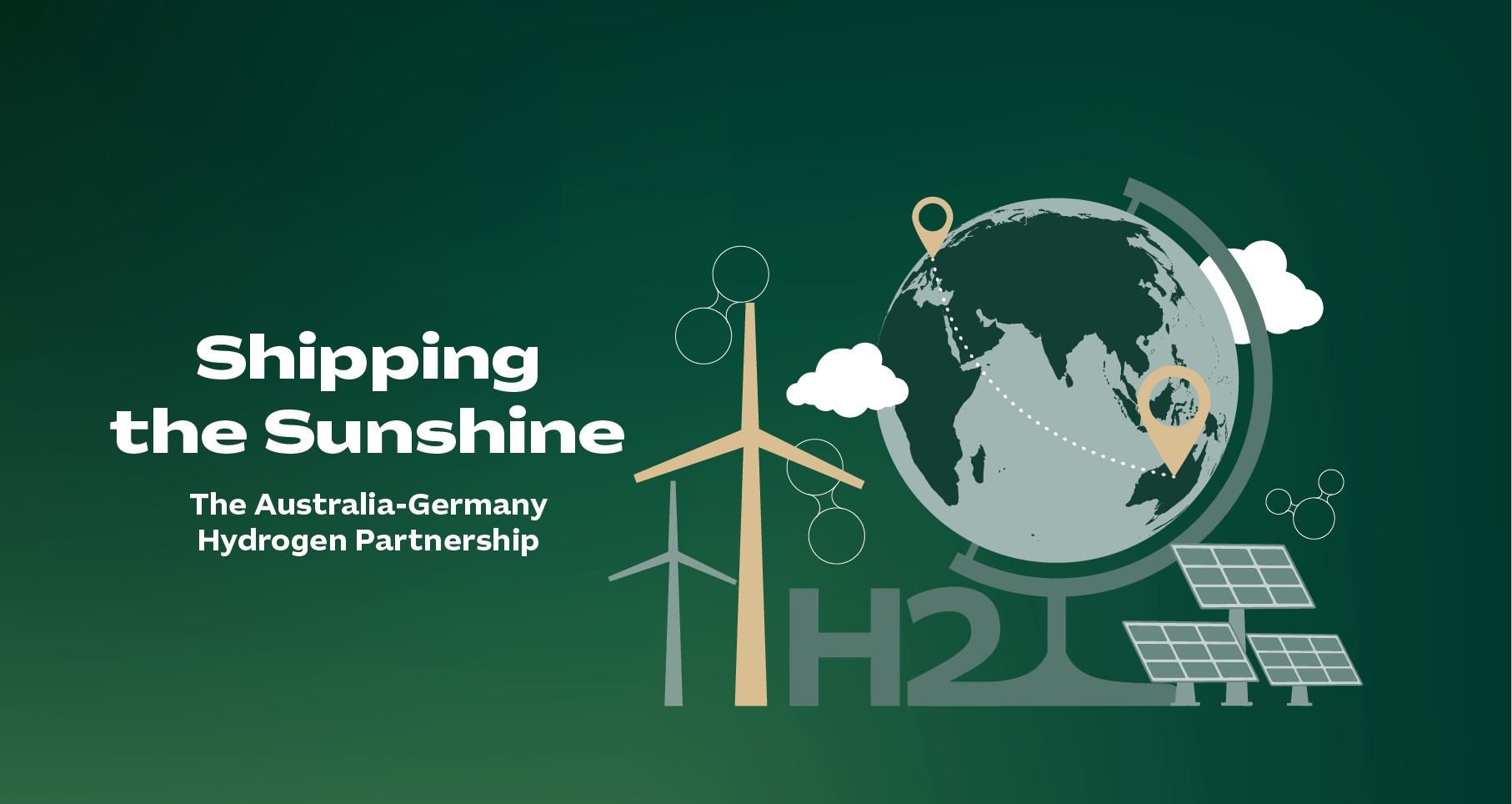
The global energy sector is transforming, and the way we produce, move, store and use energy is changing quickly. Australia and Germany are natural partners leading the way towards the development of hydrogen as a future energy resource.
Want to learn more about what green hydrogen is?
Take a look for more background information: Hydrogen energy- Australian Renewable Energy Agency (ARENA)
Our new hydrogen flyer with the latest updates on the Australia-Germany hydrogen partnership
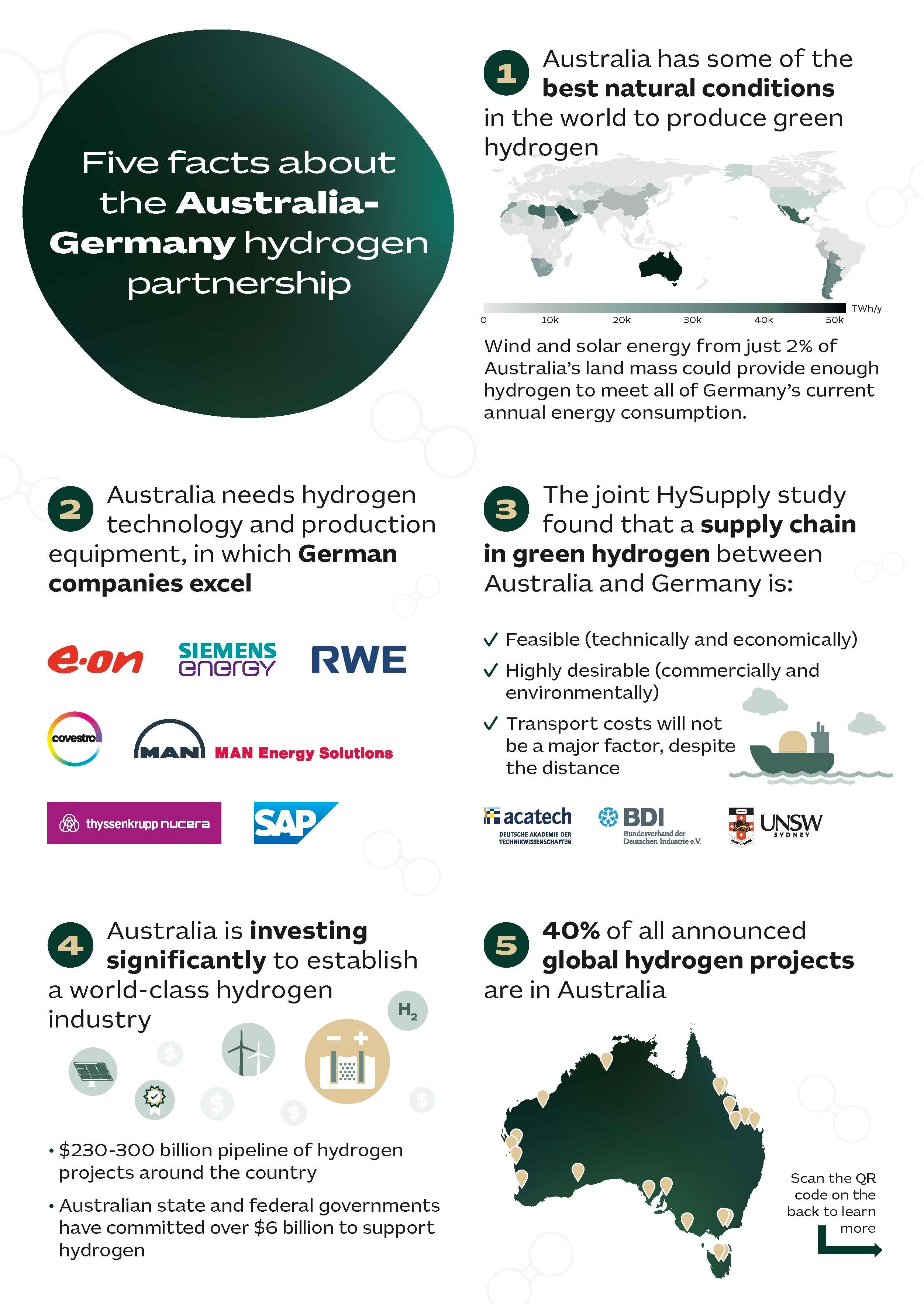
Australia's hydrogen potential
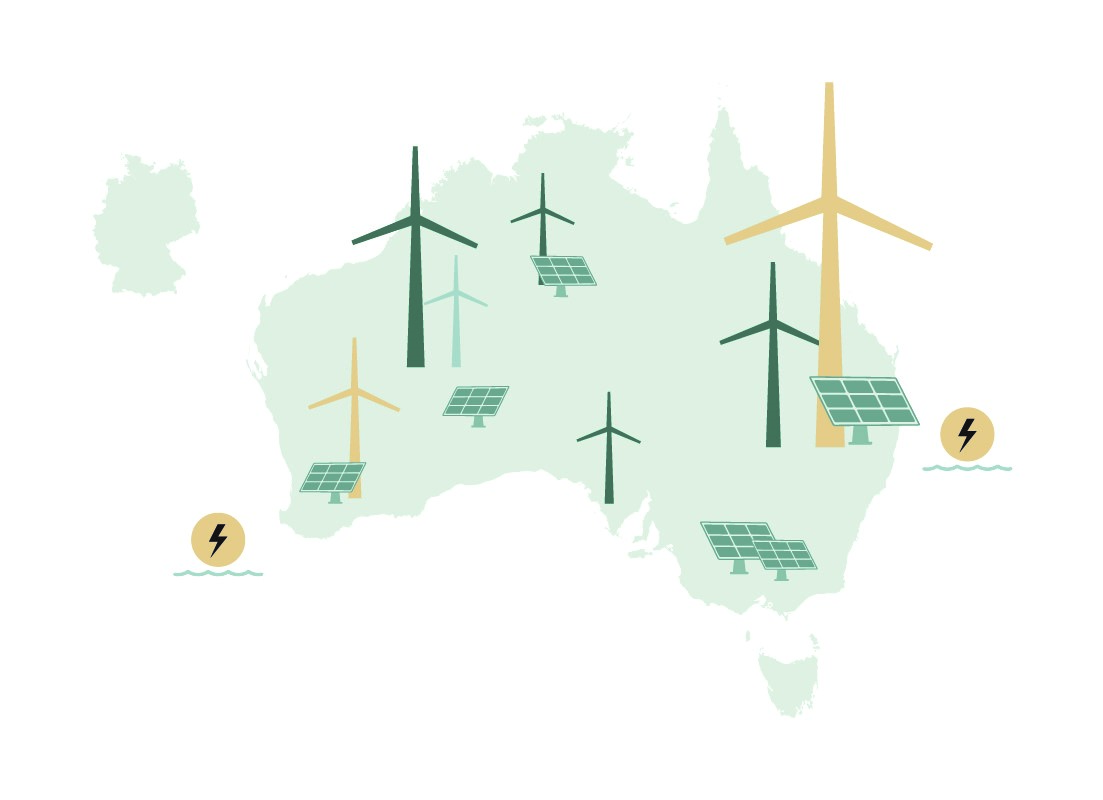
Australia’s National Hydrogen Strategy outlines the vast potential for Australia to be a world-leading producer of clean hydrogen. Our goal is ‘H2 under 2’ – that is to produce hydrogen at a cost of below A$2/kg.
Learn more about Australia's hydrogen potential
Australia:
- is large - Geoscience Australia has identified 873,000 km2 of land suitable for renewable hydrogen production in Australia. That’s 2.5 times the size of Germany.
- has enormous solar capabilities, receiving 58 million petajoules of sunshine annually – that’s about 9,500 times more energy than the country uses
- has good quality wind resources
- an ecosystem of scientists, businesspeople and government with deep skills in renewable energy and developing energy export industries
Solar energy alone in the most prospective regions in Australia covering about 3% of the country's surface area could be enough to produce more than 600mt of green hydrogen annually. That is more than 10 times Germany’s non-electric energy consumption.
Average daily sunlight hours Australia also has strong wind resources
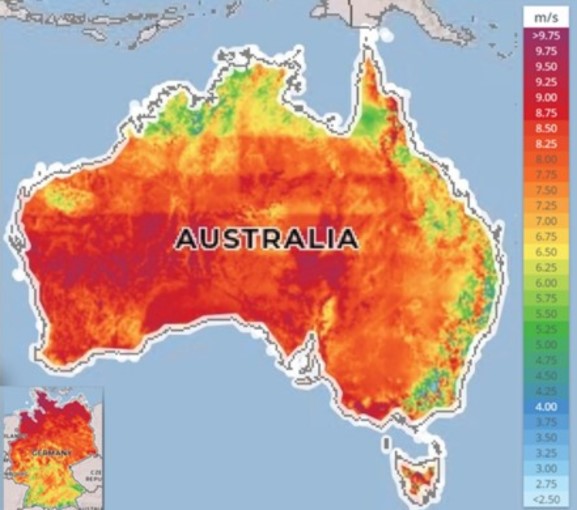
source: Statista, eglitis-media, own calculations source: Global Wind Atlas
Germany’s technological expertise and future demand
For Germany to reach its energy transition goals, experts agree it will require vast amounts of clean and – in the long term – green hydrogen. Estimates of future demand vary, but it is likely to substantially exceed Germany’s green hydrogen production capacity.
Germany's expected demand (beige) vs. production (grey) of green hydrogen
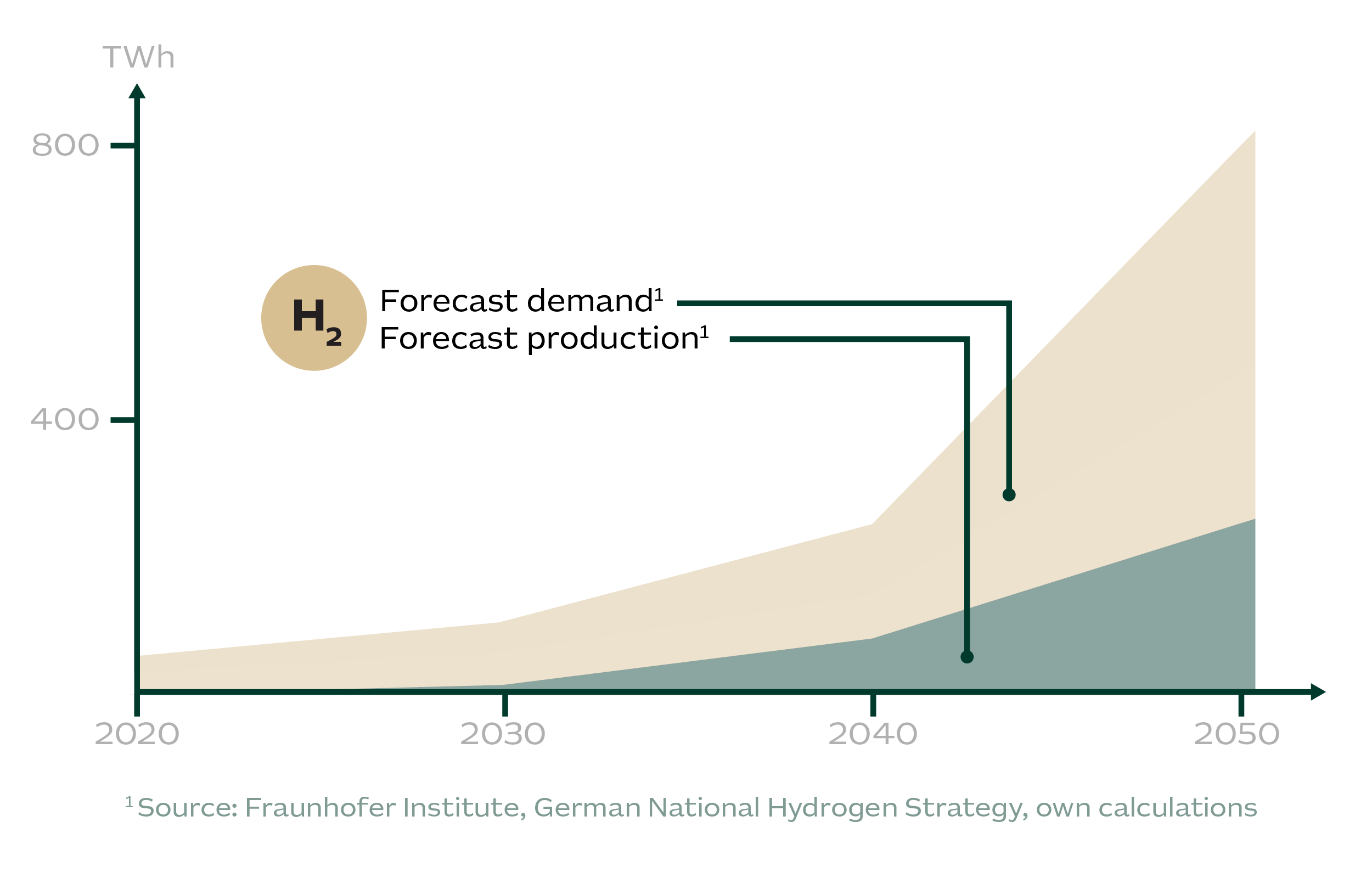
Meanwhile, German companies and research institutes are world-leaders in the development of green hydrogen production, processing and storage technology, on which any future hydrogen industry will depend.
1: Source Fraunhofer Institute, German hydrogen strategy, own calculations.
Australia and Germany join forces on hydrogen: Australia-Germany Hydrogen Accord
In June 2021 Australian and German governments announced the Australia-Germany Hydrogen Accord – a forward-leaning initiative to deepen our collaboration on climate change action and emissions reduction. The initiative’s ambition is to produce the cheapest green hydrogen in the world, which will transform entire industries, such as transport, mining, resources and manufacturing
Our enhanced collaborative activities focus on technological innovation, research, development and deployment and will lay the groundworks for a global hydrogen industry.
Our Hydrogen Accord underscores both countries’ commitment to the Paris Agreement and highlights the importance of accelerating zero and low emissions technology solutions to achieve cost parity with conventional alternatives as soon as possible. At the same time, it plays to both countries’ strengths based on Australia’s hydrogen production potential and Germany’s technological expertise and expected strong future demand.
Under the Accord the responsible ministers, the Australian Minister for Energy and Emissions Reduction, the German Federal Minister for Economic Affairs and Energy, and the German Federal Minister for Education and Research decided to pursue three new initiatives:
- HyGate Initiative: The Hydrogen Innovation and Technology Incubator will deliver novel, real-world pilot, trial, demonstration, and research projects along the hydrogen supply chain for hydrogen produced from renewable sources.
- Collaboration in Australian Hydrogen Hubs: The Hubs, which are selected regions where hydrogen users and exporters are co-located to reduce costs and share information, will help the industry to stimulate demand and achieve the scale needed to achieve the Technology Investment Roadmap goal of producing hydrogen at under $2 a kilogram, the price at which hydrogen becomes competitive with higher emissions alternatives.
- Facilitating trade of hydrogen between Australia and Germany: Building on Germany’s €900 million H2Global scheme, a mechanism that will support the international market ramp up of green hydrogen by stimulating hydrogen exports to Germany, Australia and Germany will explore options to facilitate export of hydrogen produced from renewables from Australia to Germany.
Find the Australian and the German government announcements here.
The Accord builds on Australia’s existing collaboration with Germany: our HySupply project is a feasibility study exploring opportunities for a green hydrogen supply chain from Australia to Germany. Learn more below!
HySupply: Our joint Australian-German Hydrogen feasibility study
The HySupply project has been a two-year collaboration between German and Australian consortia to investigate the feasibility of a hydrogen and hydrogen derivatives supply chain between Australian and Germany, and identify how such a partnership can be facilitated.
The project wasled by industry with support from both the Australian and German government. The Federation of German Industries (BDI) and the German Academy for Science and Engineering (acatech) on the German side, and the University of New South Wales (UNSW) on the Australian side, have assembled leading industry, academic and research partners. The project partners identified the prospects and addressed the challenges of a bilateral supply chain. Developing a supply chain of this sort is not simple, and there are many complex technical, logistical and regulatory matters to settle. The HySupply project explored the potential for:
-
How to bring costs down?
-
How should hydrogen be transported?
-
What infrastructure will be needed in Australia and in Germany?
-
How can customers be sure they are buying truly green hydrogen?

The final point report of the Hysupply project outlines the diverse range of HySupply outputs, and other activities delivered over the two years of the project, focusing on particularly on the feasibility studies and road mapping and action plans. Most importantly, the report also summarises the key findings and suggested actions for government and industry arising from this work.
In summary, for Australia and Germany’s opportunity to establish a renewable hydrogen supply chain, there is much to be optimistic about, but much more still to be done.
Read the Final Report Australia-Germany Hydrogen Value Chain Feasibility Study for more details. Follow news of the project at @AusAmdDE or check in regularly below.
HyGate: German-Australian Hydrogen Innovation and Technology Incubator
HyGATE brings together Australian and German industry and research partners to deliver new hydrogen projects, with the projects primarily occurring in Australia. On behalf of the Australian Government, the Australian Renewable Energy Agency announced conditional funding of up to AU$ 50 million and € 40 million has been awarded by Australia and Germany across four projects as part of the German-Australian Hydrogen Innovation and Technology Incubator. The recipients are:
- Edify Green Hydrogen Project – Edify Energy (AU) in partnership with Siemens Energy Global (GER)
- High-efficiency ‘Capillary-fed’ Electrolyser Pilot Project – Hysata (AU) in partnership with Fraunhofer IPT (GER)
- ScaleH2 – ATCO Australia (AU) in partnership with Fraunhofer IST (GER)
- Solar Methanol – Vast Solar (AU) in partnership with Fichtner GmbH (GER)
Find more information on the projects of the HyGate Initiative in the media release of the Australian Renewable Energy Agency. (27 January 2023)
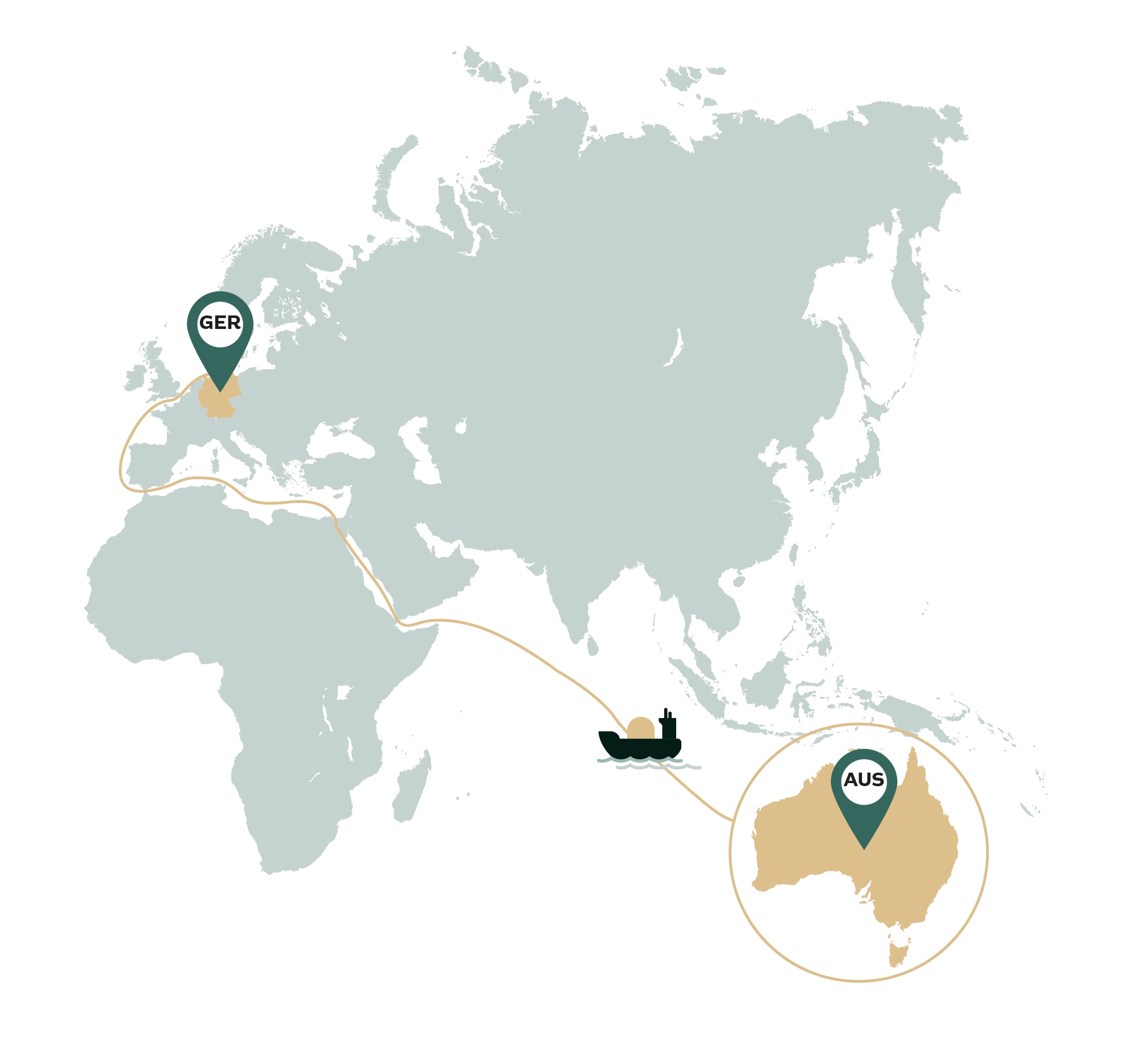
Transport is not a major cost, despite the distance
See the indicative total export value chain for green ammonia below: Variable shipping costs are a modest component of the total cost
(shipping costs shown in red circle below)
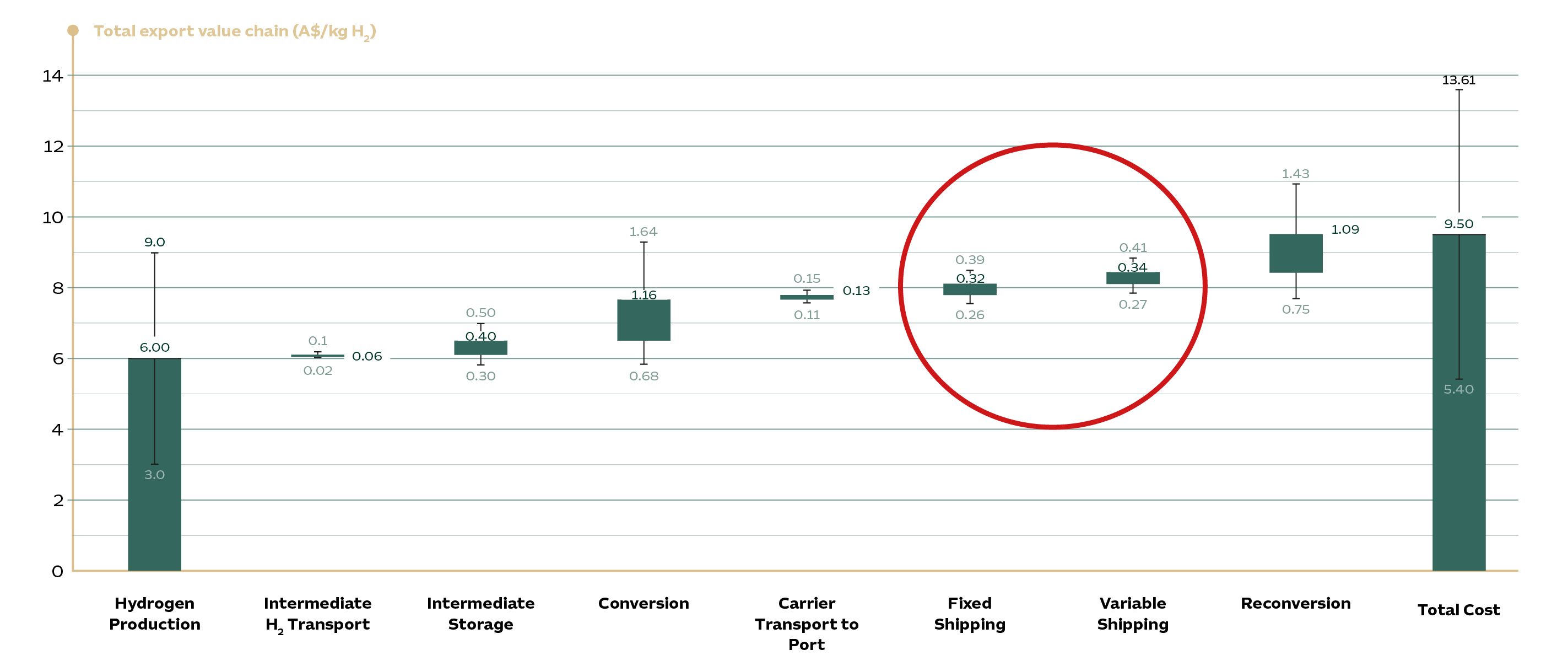
HySupply and HyGate news and resources
- Final 'Australia-Germany Hydrogen Value Chain Feasibility Study' (HySupply), January 2023
- Media release 'Growing Australia’s hydrogen supply chain with Germany' by Minister for Energy Chris Bown (27 January 2023)
- Media release 'Recipients announced for Australia-Germany HyGATE Initiative - Australian Renewable Energy Agency (ARENA)' (27 January 2023)
- Learn more about the German HySupply partners: project summaries by BDI and acatech
- Learn more about the Australian HySupply partner: University of New South Wales Sydney
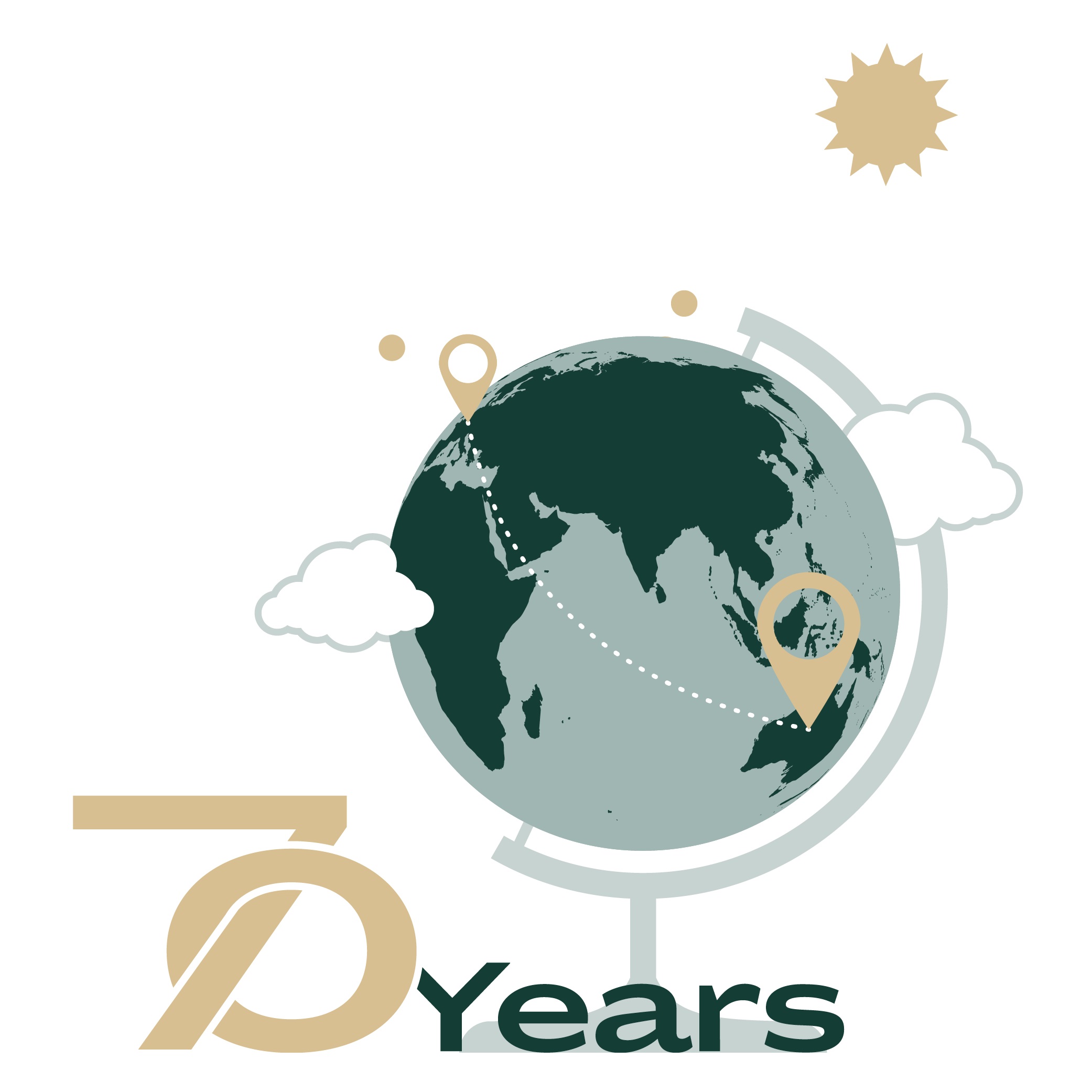 70 years of Shipping the sunshine
70 years of Shipping the sunshine
In 2022 Australia and Germany marked 70 years of diplomatic relationship, marking the anniversary with the theme of ‘Shipping the Sunshine’. Celebrations in March of last year saw guests from German and Australian politics and industry come together against the backdrop of an interactive showcase on green hydrogen, discussing and learning about the potential of the next phase of the German Australian Partnership.
Download the storyboards displayed at the event and further information here.
Other resources
Why is hydrogen the energy resource of the future? Learn more about Australia’s National Hydrogen Strategy here or subscribe to the Australian Hydrogen News. You can find more insights on Australian hydrogen project on the CSIRO website as well as Australia's Hydrogen Council pages.
